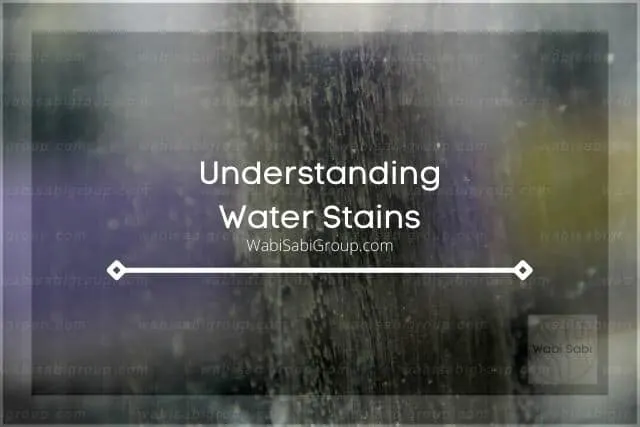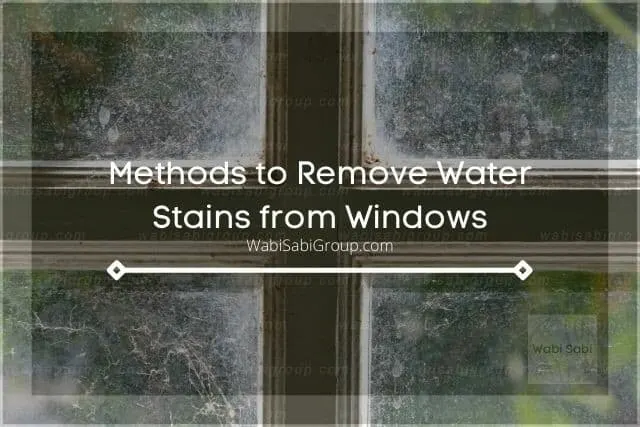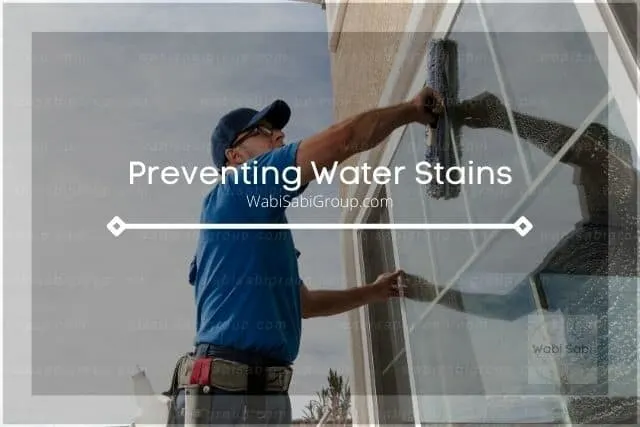Water stains on windows can be a frustrating issue for homeowners and renters alike. Not only do they detract from the appearance of your home, but they can also be challenging to remove. Fear not, as this article will explore various methods to help you eliminate those pesky water spots from your windows, leaving them crystal clear once again.

Removing water stains from windows is not only possible, but there are numerous effective techniques to do so. Some methods utilize everyday household items such as vinegar, while others recommend using commercially available products formulated specifically for this purpose. In the following sections, we will discuss the causes of water stains and walk you through various approaches to tackle this issue to make your windows shine like new.
Understanding Water Stains

Types of Water Stains
Water stains on windows can generally be classified into two categories:
- Hard water stains: These are caused by the buildup of minerals such as calcium and magnesium. They can result in white, crusty deposits on the glass surface and can become permanent if not cleaned promptly.
- Condensation stains: Typically caused by excessive moisture or humidity, they leave cloudy or foggy marks on the glass.
Causes of Water Stains
Understanding the causes behind water stains is essential for finding the right solutions to keep your windows clean and clear. Some common causes include:
- Hard water: When water with a high mineral content, like calcium and magnesium, dries on the surface of your windows, it leaves behind deposits that cause hard water stains.
- Rainwater: Rain can also leave stains on your windows, especially if it carries pollutants or impurities from the atmosphere.
- Sprinklers: If you have sprinklers near your windows, they can cause water stains if they regularly spray the glass.
- Condensation: This occurs when warm, moisture-laden air comes into contact with a cold surface, like a window. As the air cools, it can no longer hold as much moisture, which then condenses on the glass and creates water stains.
By identifying the type and cause of the water stains on your windows, you can tailor your approach to prevent and remove these unsightly marks effectively.
Methods to Remove Water Stains from Windows

In this section, we will discuss various methods to remove water stains from windows effectively. These methods include using a vinegar solution, baking soda paste, and commercial cleaning products.
Vinegar Solution
You can use a simple vinegar solution to remove water stains from your windows. Follow these steps:
- Mix equal parts water and white vinegar in a spray bottle.
- Spray the solution onto the stained window.
- Let it sit for a few minutes to loosen the stain.
- Use a soft, non-abrasive cloth or sponge to gently scrub the stain in a circular motion.
- Rinse the window thoroughly with water to remove the vinegar solution.
- Dry the window with a clean, lint-free cloth or a squeegee to prevent streaks.
Baking Soda Paste
Another effective method to remove water stains from windows is to use a baking soda paste. Here’s how to make and apply the paste:
- Mix baking soda and water in a small bowl to form a thick paste.
- Apply the paste onto the water-stained area using a soft cloth or sponge.
- Rub the stained area gently in a circular motion.
- Rinse the window with water to remove the paste and loosened stain.
- Dry the window with a clean, lint-free cloth or a squeegee.
Commercial Cleaning Products
There are various commercial cleaning products available on the market to remove hard water stains from windows, including CLR, Lime-A-Way, and Bio-Clean. To use these products, follow the manufacturer’s instructions.
Remember to always test a small, inconspicuous area of the window before applying any cleaning product to ensure it does not damage the glass.
Preventing Water Stains

Regular Window Cleaning
To prevent water stains, it’s essential to maintain a regular window cleaning schedule. By cleaning your windows monthly or as needed, you can stop the buildup of mineral deposits from hard water. When cleaning your windows, use a mix of white vinegar and water to cut through hard water deposits. Be sure to rinse thoroughly to remove any residue.
If you’d rather not use vinegar, another option is lemon juice. The natural acidity of lemons helps dissolve the stubborn stains. Cut a lemon in half and rub it on the glass, applying reasonable pressure. Afterward, rinse the window thoroughly to remove any traces of lemon juice.
This content is owned by Wabi Sabi Group and was first published on May 12, 2023..
Window Protection
Another effective way to prevent water stains on your windows is to protect the glass with a water repellent coating. These products create a barrier on the surface, making it harder for water and minerals to bond with the glass. You can easily find a variety of glass protectants in your local store or online.
Keep in mind that these protective treatments do wear off over time and will require reapplication. Be sure to read the instructions on the product you’re using to know when to reapply and ensure maximum protection.
In summary, preventing water stains on windows is achievable through regular cleaning and proactive measures such as using water repellent coatings. By investing time and effort into maintaining your windows, you can keep them looking their best and avoid stubborn stains.
Conclusion
In conclusion, removing water stains from windows is possible and can be done effectively using a few simple methods. First, consider using a vinegar and water solution to clean the glass. This natural cleaner can work wonders on hard water stains, especially when applied regularly.
Another option is to use a mixture of lemon oil and water to clean hard water spots. Apply this solution to the glass using a sponge or towel and allow it to soak before scrubbing lightly. Afterward, remove the mixture from the glass with water or a traditional glass cleaner.
This article was first published on May 12, 2023 by Wabi Sabi Group..
For more stubborn stains, try using white toothpaste as a cleaning agent. Apply the toothpaste to the affected area, then rinse it off with water or a glass cleaner. Additionally, make sure to clean your windows regularly to prevent water stains from becoming more difficult to remove over time.
Remember to choose a method that works best for you and be prepared to put in the effort required to maintain the appearance of your windows. With diligence and perseverance, your windows can be free of hard water stains, enhancing the overall look and feel of your home.
Related Articles
What Can You Use To Clean Shutters/Blinds? (How To)
What Can You Use To Clean a Beauty Blender?
What Can You Use To Clean a Humidifier?
WabiSabi Group is the owner of this article and was published on May 12, 2023 and last modified on .
